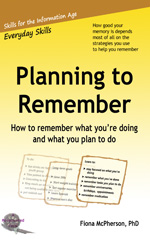- Doing more than one task at a time requires us to switch our attention rapidly between the tasks.
- This is easier if the tasks don't need much attention.
- Although we think we're saving time, time is lost when switching between tasks; these time costs increase for complex or unfamiliar tasks.
- Both alcohol and aging affect our ability to switch attention rapidly.
A very common situation today, which is probably responsible for a great deal of modern anxiety about failing memory, is that where we're required to “multitask”, that trendy modern word for trying to do more than one thing at a time. It is a situation for which both the normal consequences of aging and low working memory capacity has serious implications.
There’s an old insult along the lines of “he can’t walk and chew gum”. The insult is a tacit acknowledgment that doing two things at the same time can put a strain on mental resources, and also recognizes (this is the insult part!) that well-practiced activities do not place as much demand on our cognitive resources. We can, indeed, do more than one task at a time, as long as only one of the tasks requires our attention. It is attention that can’t be split.
You may feel that you can, in fact, do two tasks requiring attention simultaneously. For example, talking on a cellphone and driving!
Not true.
What you are in fact doing, is switching your attention rapidly between the two tasks, and you are doing it at some cost.
How big a cost depends on a number of factors. If you are driving a familiar route, with no unexpected events (such as the car in front of you braking hard, or a dog running out on the road), you may not notice the deterioration in your performance. It also helps if the conversation you are having is routine, with little emotional engagement. But if the conversation is stressful, or provokes strong emotion, or requires you to think … well, any of these factors will impact on your ability to drive.
The ability to switch attention between tasks is regulated by a function called prefrontal cortex. This region of the brain appears to be particularly affected by aging, and also by alcohol. Thus, talking on a cellphone while driving drunk is a recipe for disaster! Nor do you have to actually be under the influence to be affected in this way by alcohol; impaired executive control is characteristic of alcoholics.
More commonly, we get older, and as we get older we become less able to switch attention fast.
The ability to switch attention is also related to working memory capacity.
But multitasking is not only a problem for older adults, or those with a low working memory capacity. A study [1] using young adults found that for all types of tasks, time was lost when switching between tasks, and time costs increased with the complexity of the tasks, so it took significantly longer to switch between more complex tasks. Time costs also were greater when subjects switched to tasks that were relatively unfamiliar.
Part of the problem in switching attention is that we have to change “rules”. Rule activation takes significant amounts of time, several tenths of a second — which may not sound much, but can mean the difference between life and death in some situations (such as driving a car), and which even in less dramatic circumstances, adds appreciably to the time it takes to do tasks, if you are switching back and forth repeatedly.
To take an example close to home, people required to write a report while repeatedly checking their email took half again as long to finish the report compared to those who didn't switch between tasks!
In other words, while multitasking may seem more efficient, it may not actually BE more efficient. It may in fact take more time in the end, and the tasks may of course be performed more poorly. And then there is the stress; switching between tasks places demands on your mental resources, and that is stressful. (And not only are we poorer at such task-switching as we age, we also tend to be less able to handle stress).
There is another aspect to multitasking that deserves mention. It has been speculated that rapid switching between tasks may impede long-term memory encoding. I don’t know of any research on this, but it is certainly plausible.
So, what can we do about it?
Well, the main thing is to be aware of the problems. Accept that multitasking is not a particularly desirably situation; that it costs you time and quality of performance; that your ability to multitask will be impeded by fatigue, alcohol, stress, emotion, distraction (e.g., don’t add to your problems by having music on as well); that your ability will also be impaired by age. Understand that multitasking involves switching attention between tasks, not simultaneous performance; and that it will therefore be successful to the extent that the tasks are familiar and well-practised.
Rubinstein, J.S., Meyer, D.E. & Evans, J.E. 2001. Executive Control of Cognitive Processes in Task Switching. Journal of Experimental Psychology - Human Perception and Performance, 27 (4), 763-797.
